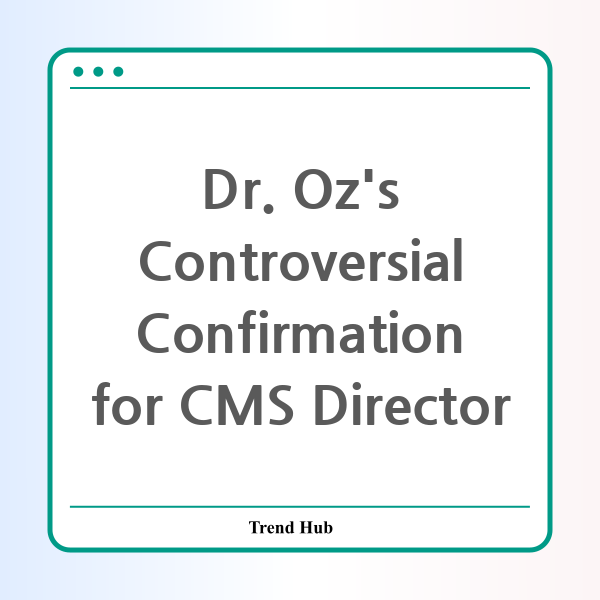* This website participates in the Amazon Affiliate Program and earns from qualifying purchases.

Is the appointment of Dr. Mehmet Oz to lead Medicare and Medicaid a step towards healthcare improvement or a cause for concern?
The Senate has recently confirmed Dr. Mehmet Oz, a familiar face from television and a former U.S. Senate candidate, as the Administrator of the Centers for Medicare and Medicaid Services (CMS). This decision, made with a narrow bipartisan vote of 53-45, has sent ripples across the healthcare landscape, reigniting debates surrounding his qualifications and previous medical claims.
Dr. Oz’s appointment comes at a crucial time when CMS oversees health insurance for around 160 million Americans and manages a staggering budget of approximately $1.5 trillion. Despite his celebrity status and public recognition, Oz faces skepticism regarding his lack of experience in government health policy, leaving many to question how he will navigate the complex world of healthcare administration.
What drove the Senate to confirm Oz? One key factor was the assurances he gave to several senators, including Republican Sen. Josh Hawley of Missouri, regarding his revised stance on contentious issues like transgender surgeries and pro-life laws. This shift in his position may have calmed some concerns but left others doubtful about his credibility and intentions.
The confirmation hearing itself was noteworthy for its lack of significant confrontation; however, many pointed out Oz's tendency to evade direct questions about potential future decisions, particularly regarding budget cuts that could affect Medicaid. Critics have highlighted his failure to clarify his position on significant matters pertaining to funding, raising red flags about his commitment to protecting vulnerable populations reliant on these services.
Historically, Dr. Oz has faced backlash for endorsing unproven medical products and making dubious claims on his television show. This background adds to the scrutiny surrounding his confirmation, especially given his past involvement in a lawsuit that resulted in a $5.25 million settlement for falsely marketing weight loss supplements. Advocates for consumer rights have expressed concerns that such a figure lacks the integrity necessary to oversee federally funded health programs.
Adding to the already heated discussion around Oz, his previous political campaign statements indicate he may not always align with mainstream GOP views. For example, he previously declared his pro-life stance without supporting punitive measures against women or doctors concerning abortion, which raised eyebrows during his Senate candidacy. His appearance on his show where he hosted transgender youth was hailed as groundbreaking, yet it contrasts sharply with his recent denouncement of his support for trans surgeries among minors.
What does this mean for the future of Medicare and Medicaid? As the healthcare sector braces for changes under Oz's leadership, the agency's direction remains uncertain, especially given potential budget cuts on the horizon. Senate Democrats have expressed distinct apprehensions regarding his commitment to safeguarding these vital programs. With an agenda that echoes the “Make America Healthy Again” initiative led by Health and Human Services Secretary Robert F. Kennedy Jr., Oz is expected to push for reforms aimed at reducing fraud and waste in governmental healthcare spending. However, many remain cautious, questioning whether these reforms will overshadow the essential coverage and benefits that millions depend on.
As we look forward, the impact of Dr. Oz’s appointment on Medicare and Medicaid will unfold over time. Stakeholders across the political spectrum will be watching closely, hoping he can balance his celebrity status with a genuine commitment to the health and well-being of Americans. Will Dr. Oz rise to the occasion, or will his past decisions cloud his effectiveness as a healthcare administrator? Only time will tell.
* This website participates in the Amazon Affiliate Program and earns from qualifying purchases.